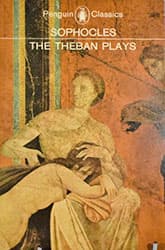Oedipus Rex
 Collection, 1965 paperback
Collection, 1965 paperbackAlso known as
Oedipus; Oedipus Tyrannus; Oedipus the King
First performed
429 BCE
Literature form
Play
Genre
Tragedy, mythology
Writing language
Greek
Author's country
Greece
Length
Approx. 14,000 words
As fate would have it
For a modern reader or playgoer, the ancient drama of Oedipus Rex can be startlingly accessible. There is little of the struggle through the language that one experiences with even more recent plays, such as Shakespeare's.
At least part of that ease may be due to the work of translators, aiming to make ancient Greek dramatics more appealing to today's readers. But, even apart from any updating effect of translation, Sophocles's work continues to strike chords.
When you first read or see Oedipus Rex, or the other two plays usually grouped with it as The Theban Plays or The Oedipus Cycle, you may be put off at first by the creaky structure. Long scene-setting speeches mixed with terse exchanges among a limited number of (possibly masked) speaking characters, who seem to overreact to every turn of events. Dramatic action taking place offstage and reported verbally to onstage characters. A singing or dancing chorus continually pushing itself forward with wise advice and mournful warnings. Rapidly rising, inexorable tragedy. The ever-present fate.
But you can quickly get used to all this and dwell instead on the human characters and their revealing dialogue. And in the mythic figure of Oedipus, Sophocles has a character for the ages.
He's the leader who is blind to the truths of his own rise to power and ends up blinding himself physically as well. The man who seeks to escape his destiny but falls further into its clutches. The unwitting patricide who discovers his wife and mother of his children is also his own mother.
The characterization may not be as intricate or sophisticated as in later theatrical eras, and the plot twists are usually telegraphed well in advance. The revelations, when they come in the story, are shocking only to Oedipus and his wife/mother because by that time the reader has already figured them out. The two are slow on the uptake but then react explosively when the facts are made clear to them.
Bear in mind, though, the audience in Sophocles's day knew the myth already. They didn't need to be told who Oedipus was, nor have any lengthy exposition of his story. They weren't watching the play to get a history lesson.
It's no one's fault
Nor did they attend to get any neatly encapsulated moral advice. What would it be? Accept your fate? Heed the psychics? Know who you're killing and screwing? Hardly.
British novelist Margaret Drabble has her narrator in The Red Queen comment on the reportage of certain ancient writers in whose work we may mistakenly look for guidance:
But Confucious did not lay down the code and manner in which the father must kill the son and the son the father. Nor did Aeschylus, who was a contemporary of Confucious, invent this code. Nor did their near-successor Sophocles. The neither prescribed nor proscribed. They simply described what was, and what had been, in the bloody history of our ugly species. There is no moral to the story of Oedipus.
Rather the ancients were following it to see characters suffering their fates, going through whatever miseries life offers.
And, by the way, this is not a matter of the gods playing with poor little humanity. The deities hardly come into the Oedipus plays at all as causative agents, not as they did in older Greek stories like the Iliad or The Odyssey. (Incidentally, Homer offered the first-known account of the Oedipus story in The Odyssey, though with the gods playing a larger role.)
Critics argue about Oedipus's culpability and whether his past actions—or ignorance—could be seen as having led to his downfall. But he clearly does not deserve his horrible fate. All along he was trying to do what he thought right, trying to avoid disaster. If anything, it is his morality and honest character that draw him deeper into tragedy.
It appears what happens in life is neither the individual's nor the gods' fault. It just is. The universe throws crazy shit at you—and what can you do? Oedipus Rex is not teaching a lesson so much as dramatizing the human experience of this reality.
Life is short. Power, fame and fortune are tenuous. People are weak. As the chorus summarizes at the end of this play:
This is the king who solved the famous riddle
And towered up, most powerful of men.
No mortal eyes but looked on him with envy,
Yet in the end, ruin swept over him.
Let every man in mankind's frailty
Consider his last day; and let none
Presume on his good fortune until he find
Life, at his death, a memory without pain.
— trans. Dudley Fitts and Robert Fitzgerald
All along, the Greek chorus has been there to help us relate to the story and the main characters. They're the voices of the ordinary people observing and commenting on the action, but they're also sometimes the playwright's voice and at times they empathize with individual characters. In all these personae they play a mediating role among the viewers, the actors and the author.
More than other Greek tragedians, Sophocles has his choruses interacting verbally with the other main characters, though not taking part in the action directly. In particular he sometimes has chorus leaders step out from the crowd to speak as characters in their own right. Some translations highlight this figure as the choragus or choragos, while others just indicate the chorus reciting.
It's all part of what makes this 2,500-year-old play about some even older mythological characters speak to people today.
— Eric

